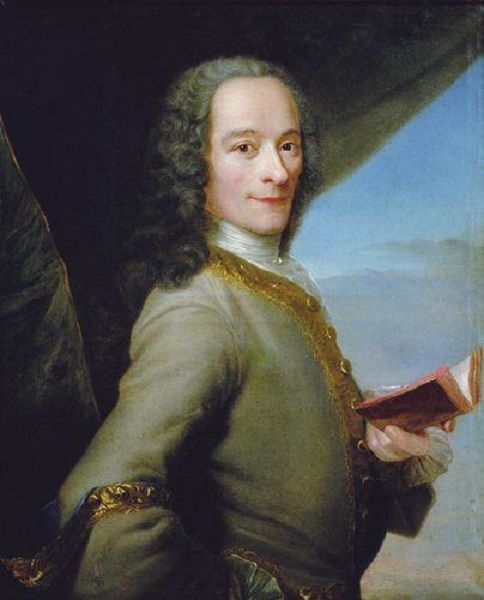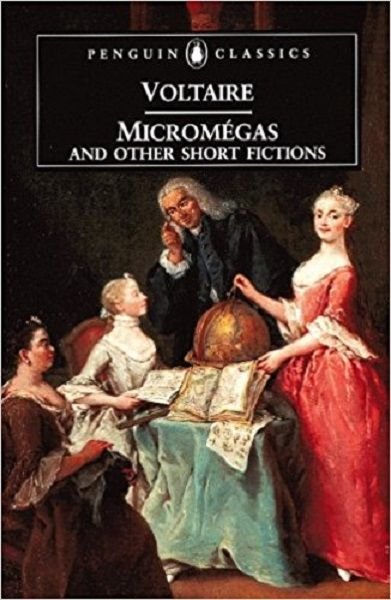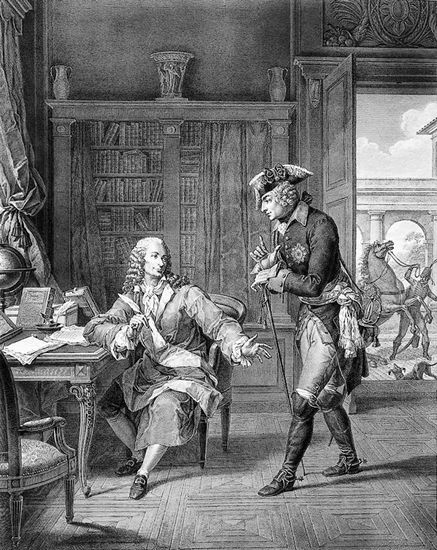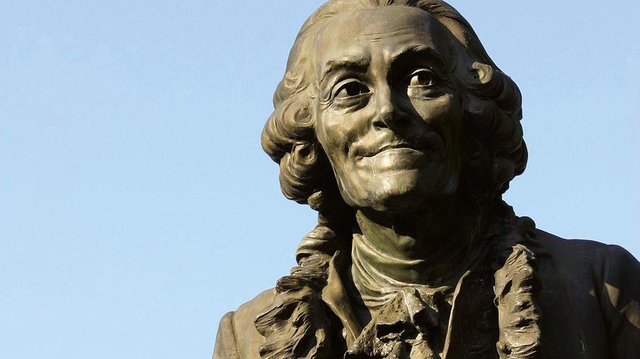Life and Creativity of Francois Voltaire
Voltaire, or as his real name is - François-Marie Arue, was born in Paris on November 21, 1964. At age of ten, his father, a notary and financial clerk, placed him at the Jesuit college "Ludwig the Great", and nine years later and for a short time at the St.-Mollor Jensen School. A few years later, Voltaire published the first, yet unfinished version of his epic poem Henrida. Because of his satyr against regent Philip Orleansky and his daughter Duchess de Berry, he was exiled from the capital and spent eight months in Sully. In the spring of 1717 Voltaire was thrown into the Bastille for eleven months. The reason for the arrest is his satyr "During the boy's reign", revealing the corrupt manners in the palace. In the prison Voltaire worked on an epic poem about Henry IV and on the tragedy of Oedipus. On 18.XII.1718 the tragedy was first presented in a Parisian theater. The young poet began to look like a decent successor to Cornea and Racine.

Voltaire's oppositional moods in the Oedipus tragedy become clearer in the League poem. League was secretly printed in Rouen. The secret spread of Voltaire's poem soon became known to a wide audience. They proclaim him the best poet of France, put it over Homer and Virgil. However, whatever talents and merits the homeland has for the common man, he is absolutely defenseless against the whims of a mundane assailant. So is the case with Voltaire. He has the unwillingness to excite a disobedience to a courtier - de Rogan, and the latter orders his servants to stab the country's first poet. Upon the deportation of De Rogan and other reports, the government hastened to throw the poet into the Bastille, and then to expel him from France. In England, Voltaire spent three years. He works a great deal, studies English materialistic philosophy, literature, acquaints himself with the achievements of scientific thought in the country. The writers of Locke, the philosopher-materialist Locke and the scientist Newton, are particularly impressed. Consequently, Voltaire became a brilliant promoter of both, and of the other. Later, the Russian Academy of Sciences chose Voltaire as an honorary member, highly valued by Newton's scientific discoveries. One of his works, written under the strong impression of what he saw and learned in England, is his book "Philosophical Letters", also known as "Letters to England" and "English Letters". Her French edition goes secretly to Rouen in 1743. The book is immediately condemned to burn.
Wandering for some time in France, Voltaire settled for a long time in his girlfriend Marquis De Chatelet in the old, secluded Sire Castle. Emily de Chatele is undoubtedly one of the most educated women in France during that time. Voltaire has done a lot of things in those fourteen years spent in Sire. He writes history, math and philosophy, as well as tragedies and comedies. Here he creates his famous satirical poem "Orleans deva". During these years, the tragedies "Mohammed" (1740), "Meropa" (1743), comedies "The Son of Man" (1736), "Nanina" (1749), the philosophical hymn "Zadig" (1748) and other works. The period of great and tense work in a relaxed and favorable setting in Sire ended with Voltaire with the death of the Marquis de Châtelet in 1749. He suffered very much this loss. Prussian King Friedrich II has long called Voltaire to himself. Now he doubles his efforts to a "good-hearted friend". The painter's letters of the king have their effect. Voltaire moved to the Prussian state. From 1749 to 1753, he lived in Potsdam, in the San-Sae Palace, received 20,000 lira of annual rent, and his duty was to correct the king's unspoken French verses and his "philosophical" writings. But soon the poet was convinced how he had deceived himself in the Prussian king. Even with the inauguration of the throne, Friedrich II replaced his father's cynically revealed tyranny with tyranny, masked with phrases, which he occupied by Voltaire. Everything ends with the fact that Voltaire returns his court honors: the key to the chambermaid and the order, and then hurries to leave the borders of the Prussian state. In Frankfurt, police arrested him for a month and subjected him to a humiliating search. Once again, without a port, Voltaire decides not to bind more to any European ruler. Already in the youth, the poet decided to protect himself from the whims of high-ranking patrons, and for this purpose, with the help of commercial operations, he gained a decent state. He bought in 1758 the little Ferney mansion on the border between France and Switzerland where he spent the last years of his life. A home theater is arranged in Ferne. Pieces are placed on Voltaire. The author himself participates in them.

By the end of his life Voltaire has worked a lot. From Farne, he guided the powerful, growing movement of the Enlightenment. And in Ferne he remains a tireless fighter. Voltaire makes known to the general public the most supporting facts of religious fanaticism, macabre and cruelty, supported by the jurisprudence of feudal France. Voltaire raises a voice in defense of the victims of fanaticism, but unsuccessfully. The nineteen-year-old young de Laubar, accused of defiling the wooden crucifix of the Abville Bridge, was burned. Of great importance, Voltaire attributes to the struggle against religious fanaticism. Its main target is Christianity and the Catholic Church, which he considers to be the main enemy of progress. According to Voltaire, whatever the origin of Christianity is, it has been perverted and has distanced itself from the "natural faith" of the people. Jesus was a poor man wandering around the world, not knowing where he would spend or what he would eat. In contrast, the Roman pope possesses palaces and palaces. He thinks of the church for a tyrannical power that despises people and treats them as deadly livestock. However, Voltaire does not accept atheism. He denies God embodied in a concrete image (Christ, Muhammad, Buddha, etc.), but believes that the idea of the punishing God must live in the people. In fact, Voltaire tends to identify God and nature. He sees the universe as a giant clock made and launched by a great watchmaker. But nature and society, once created, are no longer guided by it. Man becomes a person by virtue of his own development. He does not need prayers, but knowledge and observance of natural laws. Interesting is also the view of Voltaire about the history that can be found in all his works, not only in his purely historical works, the most significant of which are: "The History of Carl XII", "The Age of Ludovik XIV", "The Experience about the doctrine and the spirit of the peoples, "An attempt at a common history," The History of the Paris Parliament ", and others. Voltaire believes that history is both science and art. It must be both accurate, interesting and philosophical. In historical development, and in nature, he attributes paramount, paramount importance to progress. On the so-called "public contract," Voltaire dismisses the hypothesis that society has arisen through it. On the contrary, every social system is created by the fact that, at a given historical moment, this system has been imposed by force by interested people and groups. However, it does not mean that history evolves from the actions of various kings, generals and politicians. On the contrary, Voltaire says, "Everywhere I see only the stories of kings. I want to write the history of the people. " Voltaire's social and political views have a pronounced anti-feudal focus. He fights against serfdom, proclaims equality of citizens before the law, wants to introduce taxes proportionate to property, freedom of speech, and so on. But he resolutely rejects criticism of private property by considering the division of the rich and poor society inevitable.

Voltaire's ties to the European royal courts, his admiration for the British constitutional and monarchic system, have given many people reason to say that, in essence, Voltaire was a monarchist in spite of his personal conflicts with the kings of France and Prussia. At first, he does not seem to have had Republican ideas. His stay in England affirms to him that the question of good or bad governance is not solved by his form alone. When he goes to England, Voltaire encounters a public and state apparatus that is very different from what has driven him out of his own homeland. He eagerly devours the basic ideas that England has achieved in bourgeois philosophy, being elated by the English institutions. In the Philosophical Dictionary, he compares England with ancient Rome: both countries have experienced bloody civil wars, but the results have been different - Rome has triumphed in slavery, and in England the freedom has risen. This freedom is the result of the fact that the people have limited the power of the monarch, and in return has established a prudent government in which he himself participates through his chosen ones. In "Thinking about society," Voltaire openly states that the most receptive of the system is Republican. In the republic, he sees the most complete realization of natural equality among people. In his dialogues one of the participants, who apparently expresses the author's thought, says: "I will admit that I would easily adjust to the democratic system. . . I love seeing how free people themselves create the laws that guide them in life as they build their homes. "The most dangerous, most unbearable for the rulers and the religious fanatics and hypocrites was Voltaire when he was fighting against one blatant injustice, against a profound social injustice. His huge popularity among the entire French people he has won with his struggle in connection with a number of processes in which he took the country of innocent condemned. This is the case with Jacques Callas, a merchant from Toulouse and Protestant. He was publicly dissected, accused of murdering his son to prevent him from going to Catholicism. When he learns of his execution, Voltaire publishes "The True Documents Concerning the Death of the Two Callas and the Judgment of the Toulouse Court." At the same time, he was bombarding all possible judicial and governmental bodies with statements and demands that Callas be rehabilitated, albeit posthumously. The State Council admits that the case must be reconsidered. Thus, Jacques Callas was acquitted.

There are still many cases where Voltaire, with all his energy of a fighter, has defended innocent victims of religious intolerance and judicial arbitrariness. Voltaire opposes the death penalty, anti-torture, insists on publicity and court visibility, insists on respecting the defendant's right of defense, denies the right of every area in France to have its own legislation left over from the times of feudal fragmentation, etc. In contrast to the theological metaphysics of the 17th century, Voltaire raises a scientific study of nature. He rejects Cartesian teaching about the soul and innate ideas, and considers the observation and experience as the source of knowledge, advocating Locke's sensei. The life of Voltaire ends with the story of his death and burial that reflect his long life. Tortured for life by the grief that he can not live in Paris, he finally receives a semi-official permit, and on February 10, 1778, this 84-year-old old man returns to his hometown. But those who have "allowed it" already know that he does not have much to live on. With the arrival of the Voltaire in Paris, his pilgrims from the Comedie Frances Theater arranged a solemn reception on March 16th. After the performance of "Irene", the artists put on the stage the artist's bust, sculptured by one of the biggest sculptors and crowned with a laurel wreath.
Two and a half months later, on May 30, 1778, at 11 o'clock in the evening, Voltaire died. The Catholic Archbishop of Paris and the clergy of the nearest church to the home of the deceased refuse to bury him on the accepted ritual. The King, Ludovic XVI, pretends "not to interfere in purely church matters." It creates the danger of the body of the dead being thrown into the river or the hungry dogs in the field. Then the abbot Minyo arrives on the third day, wrap the deceased in a long robe, puts a nightcap on his head, puts him in a rental carriage as a sleeping old man, and secretly takes him to his abbey in Champagne in the night of June 1 to June 2, where he buries him without ceremonies and noise. After thirteen years, the Revolution took him to Pantheon with a hearse, which read: "He has prepared us for freedom." There is a urn in the national library in Paris, which claims to be the dust from the heart of Voltaire. It is written in the poll, "My heart is here, and the spirit is everywhere." Voltaire may be considered the head of the French enlighteners in the extreme versatility of their work. A philosopher, poet, playwright, unsurpassed publicist, he has managed to make the ideas of the Enlightenment available to the masses
good writing philosophy story post thank for shearing
This post has received gratitude of 12.29 % from @appreciator thanks to: @daydreaming.
Congratulations, you were selected for a random upvote! Follow @resteemy and upvote this post to increase your chance of being upvoted again!
Read more about @resteemy here.
Congratulations @daydreaming! You have completed some achievement on Steemit and have been rewarded with new badge(s) :
Click on any badge to view your own Board of Honor on SteemitBoard.
To support your work, I also upvoted your post!
For more information about SteemitBoard, click here
If you no longer want to receive notifications, reply to this comment with the word
STOPPlease forgive the slightly tangential comment.
Voltaire's understanding of Leibniz is particularly inept. The facile optimism of Dr. Pangloss completely misses the mark.
Leibniz' uses the term "best of all possible worlds" in a somewhat technical sense, namely: the balancing of richness of phenomena with an elegant law structure (in physics). What is at issue is accordingly a very difficult maxima-minima problem.